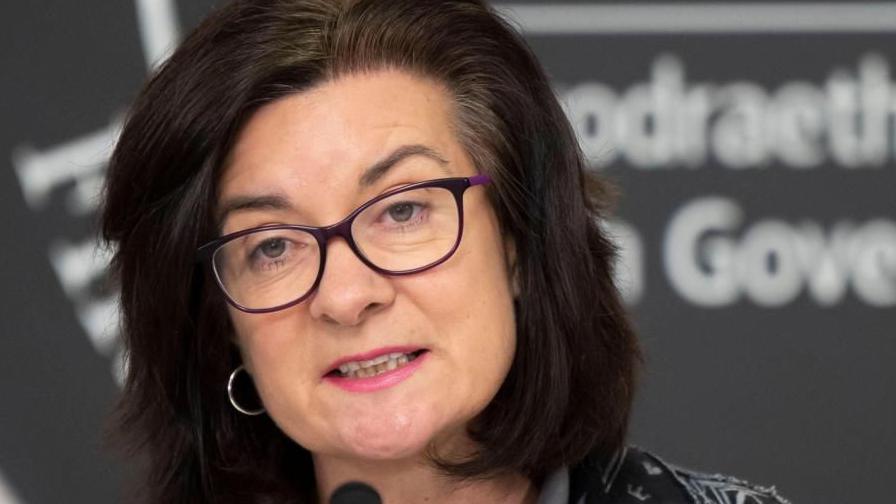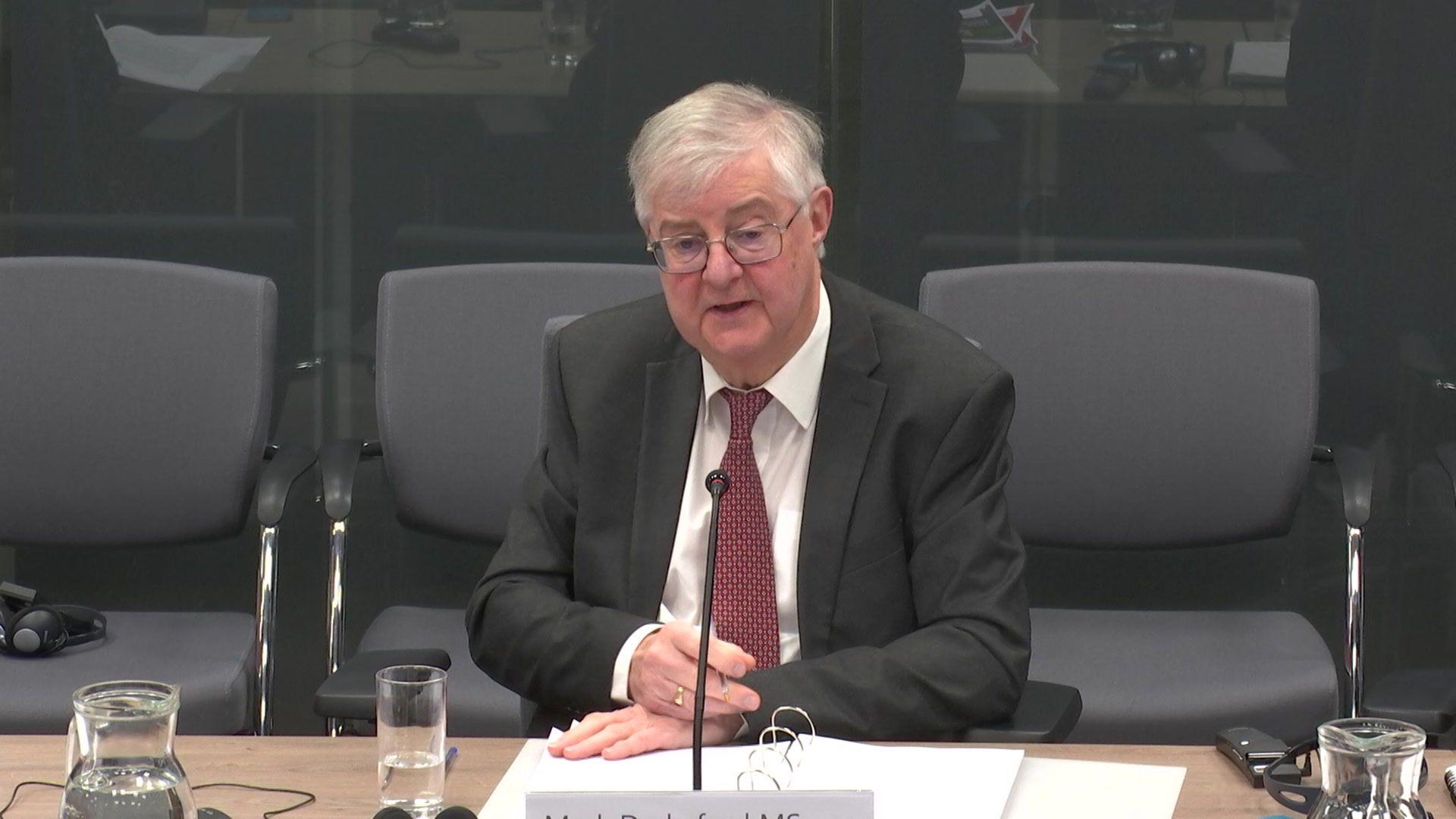Morgan confident Welsh councils won't go bust

Eluned Morgan said she was confident Wales would not see council bankruptcies like England had experienced
- Published
First Minister Eluned Morgan has said she is confident that Wales will not see local authorities going bust, after the Labour leader of Flintshire council warned the threat of bankruptcy had not gone away.
An average 4.3% funding increase for councils was announced on Wednesday, a £253m increase for the next financial year, less than half the budget shortfall they say they are facing.
Morgan said she understood any funding increase would "never be enough" but that councils were now in a "much better place".
She added that local authorities across Wales would be "breathing a sigh of relief".
Meanwhile, Morgan's Finance Secretary Mark Drakeford defended his budget after academics said the government is likely to be overstating how much funding is increasing by next year.
Council cuts and bankruptcy fears despite cash boost
- Published11 December 2024
NHS to get £600m Welsh budget boost to tackle waits
- Published10 December 2024
Back budget or Wales could lose £1bn, FM warns
- Published3 December 2024
Speaking to BBC Radio Wales Breakfast, Morgan said she recognised the "massive pressure" facing local authorities, but that money was being made available for the first time "in a very very long time".
On the threat of bankruptcy, she said the government had been keeping a close eye on councils.
"We check their reserves, we check where they're at. We are confident that we are not in the situation that they are in England, where many, many councils have gone bust.
"So of course, we will keep monitoring that situation," she said.
Morgan also criticised what she called the "ridiculous system" to deal with funding to cover the increase in national insurance (NI) contributions for public sector employers.
Welsh ministers will not find out how much funding will be available until May or June next year, from the Treasury at Westminster.
The changes to NI begin at the start of next April.
She said she would be urging Chancellor Rachel Reeves to give the Welsh government better foresight.
She said she was "pretty miffed", but that she expected increased contributions for people employed directly by the public sector to be fully covered.
There is still uncertainty over whether private companies or charities who provide services for the public sector will be included.
The first minister said that the 4.3% average funding boost for councils would - to an extent - alleviate any shortfall.
Charities and voluntary groups, the private care sector as well as many GP and dental practices have warned of the potentially damaging affects of NI increases on them.
'Seven months limbo'
New Conservative Senedd leader Darren Millar said waiting many months to know how much UK government money would be provided to help Welsh ministers deal with the NI increase was "completely unacceptable".
This amounted to "seven months of limbo for public services here in Wales", he said, urging Morgan to "demand that the costs incurred be completely covered for the Welsh public sector and the services they commission".
"Clarity must be provided immediately, not in seven months' time," he added.
Plaid Cymru called Morgan's confidence on local government finances "jarring when compared to warnings from council leaders".
Peredur Owen Griffiths, the party's local government spokesperson, said local authorities were "already facing a £559m shortfall" and "uncertainty around reimbursement after the national insurance hikes is going to make things even worse".
"Plaid Cymru is clearer than ever that Wales desperately needs a fair funding formula – something that Labour have given up on since their London bosses came into power."
In her interview, Morgan repeated her hope that the longest NHS waiting lists of more than two years would come down to eight thousand by the spring - the figure stood at over 23,000 in September.
More than £600m of additional funding was announced for the NHS in Tuesday's budget, on top of £50m announced recently for this year to help bring down the longest waits.
Morgan said the extra money meant that doctors and other medical staff could be paid to work overnight, evenings and weekends to try to clear the backlog.
'No real terms growth'
According to finance expert Guto Ifan, from Cardiff University, Welsh government budget documents say spending is increasing by £959m in 2025-26, or 2% in real terms - where inflation is taken into account.
But he estimated there was £557m of day-to-day spending allocated for this year that had not been included in the sums.
Had the money been included there would be "no real terms growth in the size of the day-to-day budget from 2024-25 to 2025-26".
In a blog post, external, Mr Ifan wrote it was "more difficult than usual" to scrutinise the figures.
"This is because it means the stated growth in 2025-26 spending plans are likely to be overstated," he said.
He also warned that next year's budget round promises to be "more difficult, and might feel like a return to austerity for some public services".
David Phillips, of the Institute for Fiscal Studies, said: "The Welsh government has yet to allocate all its funding for the current financial year. That means the budget documents likely overstate the year-on-year increase in spending that are implied by the plans set out for next year.
"If all the funding available for the current financial year is in fact needed this year, the draft budget would imply no increase in day-to-day spending on public services, after accounting for inflation."
Both told BBC Wales the full picture will only become clear in February.

Mark Drakeford gave evidence to the Senedd's finance committee on Thursday
Speaking to the Senedd's Finance Committee on Thursday, Mark Drakeford claimed his budget "understates the impact of funding over these two years because we've had a significant amount of additional money available to us… this year".
"We've had more money [this year] than in any year I can remember for at least a decade."
Andrew Jeffreys, Treasury director in the Welsh government, said some items had not been included in this year's budget calculations because "some of those are one-off funding allocations for things that don't recur".
During the session Jeffreys confirmed that promised UK government funding to cover rising national insurance costs in the public sector is expected to be subject to the Barnett formula – the system used to fund the Welsh government which is partly based on population
Drakeford said it would be "fundamentally unfair" if the funding provided is less than required, and suggested he would object if that was the situation.
"If things worked out… where Wales doesn't have full cover, whereas English public authorities do have full cover, well, I won't simply be leaving it there," he added.
Additional reporting by Adrian Browne